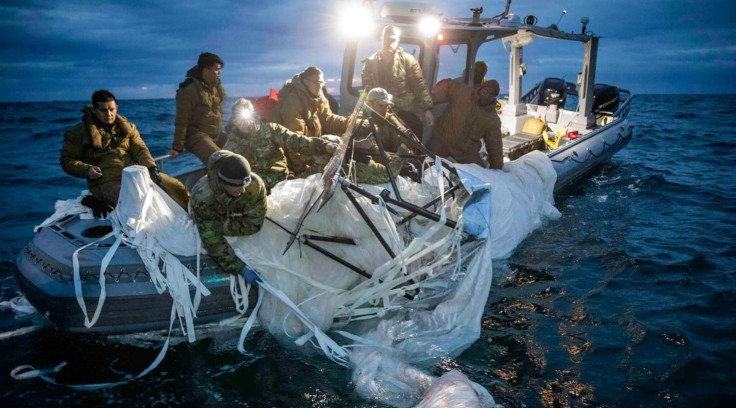
The Chinese balloon that spent more than a week flying over North America before being shot down over the Atlantic was equipped to collect and geolocate communications, according to the U.S. government.
A U-2 spy plane sent up to examine the balloon, according to a senior official with the state department, was able to identify electronics.
"The high-altitude balloon's equipment was clearly for intelligence surveillance and inconsistent with the equipment onboard weather balloons," the official said. "It had multiple antennas to include an array likely capable of collecting and geolocating communications.
"It was equipped with solar panels large enough to produce the required power to operate multiple active intelligence collection sensors."
The balloon was retrieved off the coast of Myrtle Beach, South Carolina, a day after being shot down by a fighter jet.
According to U.S. claims, China has deployed these balloons to gather intelligence across 40 countries and five continents.
The Pentagon has up until now argued that even while the balloon contained this equipment, it did not give China any additional capacity for gathering intelligence over and beyond what it already possesses through satellites and other ways.
The Biden administration has come under fire from Republicans for failing to shoot the balloon before it crossed the nation. According to the Pentagon, it did not pose a serious threat and could not be shot down over land without endangering people on the ground.
Biden says the Chinese spy balloon he let traverse the entire country gathering surveillance was "not a major [security] breach." pic.twitter.com/dnMFciOJRB
— RNC Research (@RNCResearch) February 10, 2023
Biden said on Thursday that he did not regret shooting down the balloon sooner.
"It's not a major breach," Biden stated. "It's a violation of international law. It's our airspace. And once it comes into our space, we can do what we want with it."
He claimed that U.S. military officials were concerned that if the balloon and its parts were shot down over land, they may fall into a populated area, reports The Guardian.
"This thing was gigantic. What happened if it came down and hit a school in a rural area? So I told them as soon as they could shoot it down, shoot it down. They made a wise decision." he said.
"We know the PRC used these balloons for surveillance," a senior State Department official said. "High-resolution imagery from U-2 flybys revealed that the high-altitude balloon was capable of conducting signals intelligence collection operations."
On Thursday, members of Congress received briefings from Pentagon, State Department, and U.S. Intelligence officials behind closed doors. Since the Chinese appeared to stop transmitting information once the U.S. became aware of the balloon's position and steps were taken to prevent its gathering capabilities, it was determined that the balloon operation yielded no new intelligence, according to CNN.
Ely Ratner, the assistant secretary of defense for Indo-Pacific security issues, claimed that the Pentagon had unsuccessfully attempted to get in touch with People's Liberation Army (PLA) leaders through military channels.
The FBI has begun to evaluate pieces of the suspected Chinese spy balloon, senior officials say, adding that understanding its components is vital intelligence and could be "important pieces of evidence for future criminal charges that could be brought." https://t.co/ny0abI9VUA pic.twitter.com/aAUbOVadx7
— CNN Politics (@CNNPolitics) February 9, 2023
"We continue to have an outstretched hand, including immediately following the downing of the balloon," Ratner told the Senate. "Unfortunately, to date, the PLA is not answering that call."
Sanctions are being considered by the administration against individuals responsible, which may include the balloon's manufacturer who, according to the state department, is an "approved vendor" of the PLA.
"We will also look at broader efforts to expose and address the PRC's [People's Republic of China's] larger surveillance activities that pose a threat to our national security, and to our allies and partners," the department said.
Since the U.S. military lacks the authority to gather intelligence within the country, a special dispensation was granted so that a counter-surveillance operation for the U-2 plane could be carried out.
Although a recovery operation is currently underway off the coast of South Carolina, FBI officials reported that only a small portion of the equipment payload of the balloon has been recovered. According to the officials, the fragments that have been retrieved are being cleaned of salt and saltwater.
The Chinese spy balloon could monitor communications signals and contained advanced surveillance equipment.
— NTD Television (@TelevisionNTD) February 10, 2023
This as new details emerge on the capabilities of the device that flew over the United States for days before being shot down.https://t.co/SOQBxRcOEm pic.twitter.com/FulWZNiO1U
In order to resist China's "growing coercion" in Asia, Wendy Sherman, the deputy secretary of state, announced on Thursday morning that the Biden administration was evaluating its policy to China and would be investing diplomatically in the Pacific.
Sherman told the Senate foreign relations committee, "It is true that our way of life, our democracy, our belief in our values, in the rules-based international order, is being challenged. And we have to meet that challenge."
The US will reestablish its diplomatic mission in the Solomon Islands and plans to deploy Peace Corps volunteers and diplomats back to Kiribati and Tonga.
© 2025 Latin Times. All rights reserved. Do not reproduce without permission.




